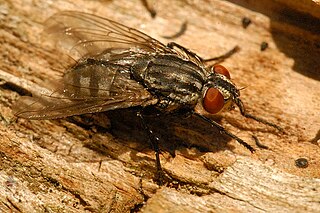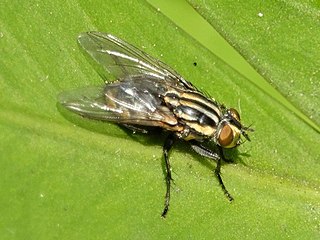
Sarcophagidae are a family of flies commonly known as flesh flies. They differ from most flies in that they are ovoviviparous, opportunistically depositing hatched or hatching maggots instead of eggs on carrion, dung, decaying material, or open wounds of mammals, hence their common name. Some flesh fly larvae are internal parasites of other insects such as Orthoptera, and some, in particular the Miltogramminae, are kleptoparasites of solitary Hymenoptera. The adults mostly feed on fluids from animal bodies, nectar, sweet foods, fluids from animal waste and other organic substances. Juveniles need protein to develop and may be laid on carrion, dung or sweet plant foods.

Oestroidea is a superfamily of Calyptratae including the blow flies, bot flies, flesh flies, and their relatives. It occurs worldwide and has about 15,000 described species.
Fritz Konrad Ernst Zumpt was a German entomologist who worked mainly in Ethiopia, but also to a lesser extent in Uganda, Ghana and Mozambique. He is best known for his work on Diptera and the associations between insects and African mammals, as well as for his work on myiasis.

Boris Borisovich Rohdendorf was a Soviet entomologist and curator at the Zoological Museum at the Moscow University. He attained the position of head of the Laboratory of Arthropods, Paleontological Institute, Russian Academy of Sciences, Academy of Sciences of the Soviet Union in Moscow. A student of Andrey Martynov, he was a prolific taxonomist who described numerous new taxa, including fossil Diptera, and published important syntheses on fossil insects. His work is being extensively revised by the current generation of Russian paleoentomologists.

Sarcophaga is a genus of true flies and the type genus of the flesh-fly family (Sarcophagidae). The members of this cosmopolitan genus are frequently known as common flesh flies.
Sarcofahrtiopsis is a genus of small flesh flies. Most are known from the Antilles and Central America. Many species feed on semiterrestrial crabs of the genus Cardisoma or are associated with bats.

Nyctia is a genus of true flies in the family Sarcophagidae.
Senotainia is a genus of satellite flies in the family Sarcophagidae. There are more than 70 described species in Senotainia.

Wohlfahrtia is a genus of flesh flies in the family Sarcophagidae. There are at least 20 described species in Wohlfahrtia.

Paramacronychiinae is a subfamily of flesh flies.
Sarcophaga burungae is a species of fly in the family Sarcophagidae. It is found in the Afrotropical region.
Sarcophaga gnu is a species of fly in the family Sarcophagidae. It is found in Zaire in the Afrotropical region.
Angiometopa is a genus of true flies in the family Sarcophagidae.

Brachicoma is a genus of true flies in the family Sarcophagidae.
Erythrandra is a genus of true flies in the family Sarcophagidae.
Galopagomyia is a genus of true flies in the family Sarcophagidae.
Goniophyto is a genus of true flies in the family Sarcophagidae.
Mimagria is a genus of true flies in the family Sarcophagidae.
P. S. Nathan, P. Susai Nathan or P. Susainathan was an Indian naturalist, entomologist and a natural history specimen collector and dealer. His natural history business was continued by his daughter-in-law Theresa Rajabai Susai Nathan and still later by her daughter-in-law Nellie J.P. Nathan. A number of species are named after the collections made by him and his family.

Oxysarcodexia is a genus of flies belonging to the family Sarcophagidae.







